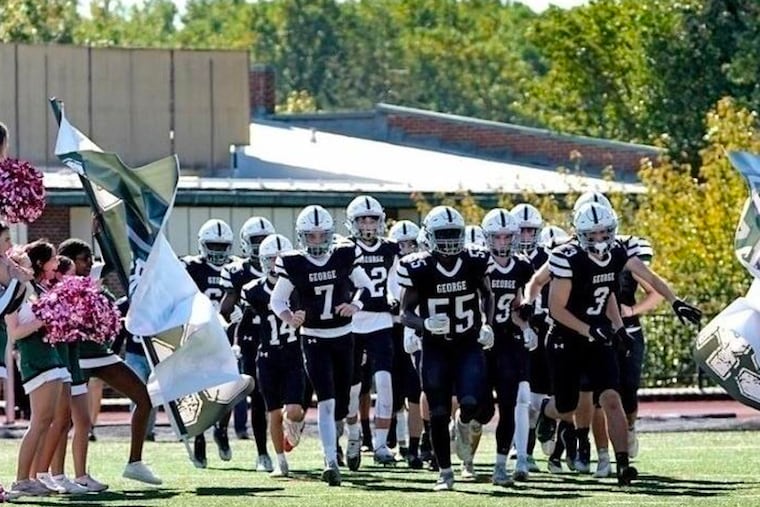George School football program on the verge of shutting down; parents and students speak out
The private Quaker boarding school has had an 11-man football team since 1923. After the head coach resigned, the school's administration is seeking other options for the program's future.

When Joe King met with George School’s football team, the defensive coordinator could see the frustration and confusion in the faces of the players who had just found out their high school program could be on the verge of shutting down.
“My message to them has been relax, stay confident, and continue to work out,” King told The Inquirer. “I’m more concerned about their mindset, because when they heard this, right away they had an empty feeling that they’re being given up on.”
The private Quaker boarding school in Middletown Township sent out a letter to the George School Community last month, indicating it is considering making the football program an eight-man program or completely eliminating it due to student health and safety concerns.
» READ MORE: This Philly middle-school teacher dreams of letting his students tell their own stories
The school has operated a varsity football team since 1923. This year would mark the 100th anniversary. Since the announcement, parents, alumni, and students have rallied together, writing letters to the administration and asking the community to sign a petition for George School to remain an 11-on-11 football team.
Recently, players held a meeting with head of school Sam Houser and director of athletics Kurt Ruch, along with other staff members, including King. It was an opportunity for players to make their case for why the program should continue.
“We are grateful for the input shared by our families, faculty, and alumni in this process,” the school said in a statement. “Any decision about how to move forward will be made with the best interests of our current players, families, and coaches at the forefront, while also recognizing George School football’s rich history and impact on school culture.”
Former coach Dom Gregorio, who declined to be interviewed for this story, resigned from his position Dec. 13 when the initial announcement came out from the school’s administration about the state of the football program.
Gregorio led the team for three years. Following the Cougars’ 4-6 season, King said he sensed Gregorio wouldn’t be returning for a fourth.
“I felt that maybe he tried his best and he felt that he couldn’t accomplish what he had planned,” King said.
But King, who resides in Doylestown and has been coaching for more than 20 years, making stints at Central Bucks West and East, was surprised by how the school handled Gregorio’s departure.
“They went right from his resignation to presenting a letter saying that we don’t have enough players for football,” King said. “I was very confused at that point. Why wouldn’t they reassess the program and try to hire a new coach and then go from there?”
The letter from Houser and Ruch read: “Coach Dom informed us that he can no longer lead the football program as it exists due to concerns for the safety of our student-athletes. Injuries resulting from a lack of depth in our roster caused significant challenges this season.”
Gregorio, a former defensive coordinator at Abington and Bishop McDevitt, told the Bucks County Courier Times on Dec. 19 that he would only have 15 players returning next season and told administrators he needed 19 more, some of whom should be scholarship players.
However, investing in a full football team, George School’s Board of Trustees said, would require a significant roster increase and an investment in financial aid that would alter the distribution of funding to other programs.
Parents are angered by the administration’s decision of only considering two options — transitioning to eight-man football or not having a program next year. Yardley resident Rachel Renshaw, whose son is a junior cornerback, believes there’s a lack of communication between the athletes and school’s leadership.
“This is not just about a game, this is about how it affects their educational pursuits,” Renshaw said. “Football gives them a chance to go out and play a game, whether they win, it’s not important … The importance is that they’re going to play the sport they love.”
Renshaw wanted to make sure the players’ voices were heard. She, along with other parents, helped spread awareness on Facebook and Instagram to the alumni and the Bucks County community about the Cougars program.
The varsity football team also sent a letter addressed to the administration, board of trustees, and Ruch, expressing those concerns about not being consulted in the decision-making process.
“We have enough returning players and internal from former players and new students to have a competitive 11-man football team next season,” the team’s letter said. “We do not need to recruit more than two or three players to safely field a team. We know that the school can do that, as it has done it for football in the past and continues to do it for other sports.”
If George School, which competes in the Bicentennial Athletic League, were to become an eight-man program, it would join the Keystone League, which is made up of teams from Pennsylvania, Maryland, Washington, and Virginia.
Four schools in Pennsylvania played eight-man football this past season, including Perkiomen School, Valley Forge Military Academy, Delco Christian, and Mercersburg Academy. The students emphasized to the administration that of the seven teams in the league, none are within a driving distance of 30 minutes. Only three schools are about an hour away.
While the administration has yet to make a final decision, a Jan. 12 email from the school indicated that a determination will be made no later than the end of the month.
“After the meeting, we’re very optimistic,” King said. “We’re trying to remove any negativity that was part of the program in the past. Remove all that negativity into positivity. My message to the kids is that we’ll continue to work.”